Южный СуданSouth SudanНа карте мира Map2–4 марта 2013
March Посетим каменоломню. Let’s visit a rock quarry. 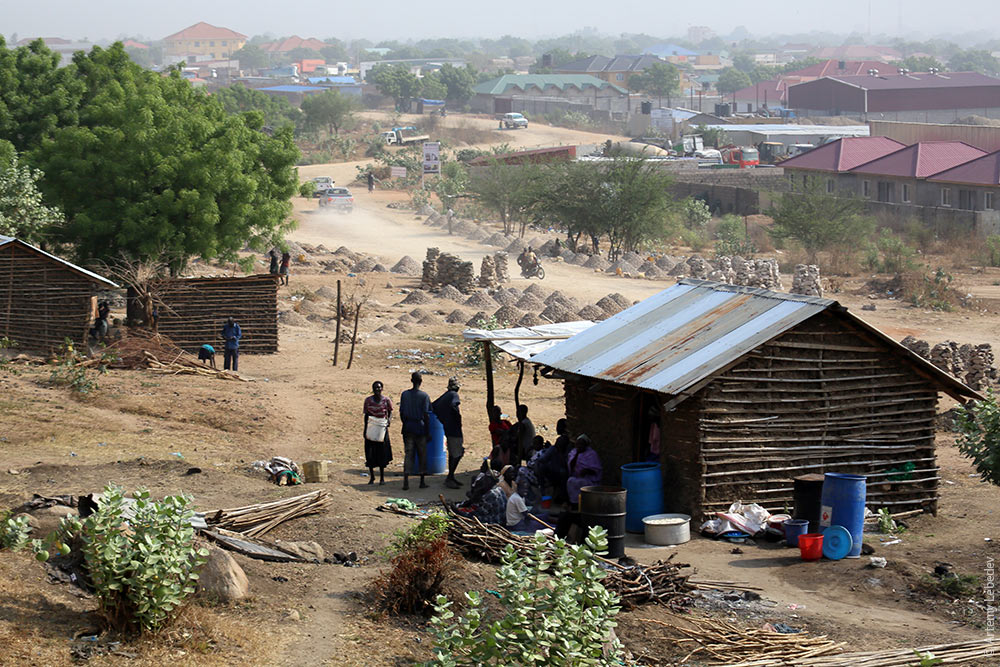 Каменоломни расположены обычно в местах, где есть хорошие, годные, большие камни. Quarries are usually situated in locations where there are nice, big, suitable rocks. 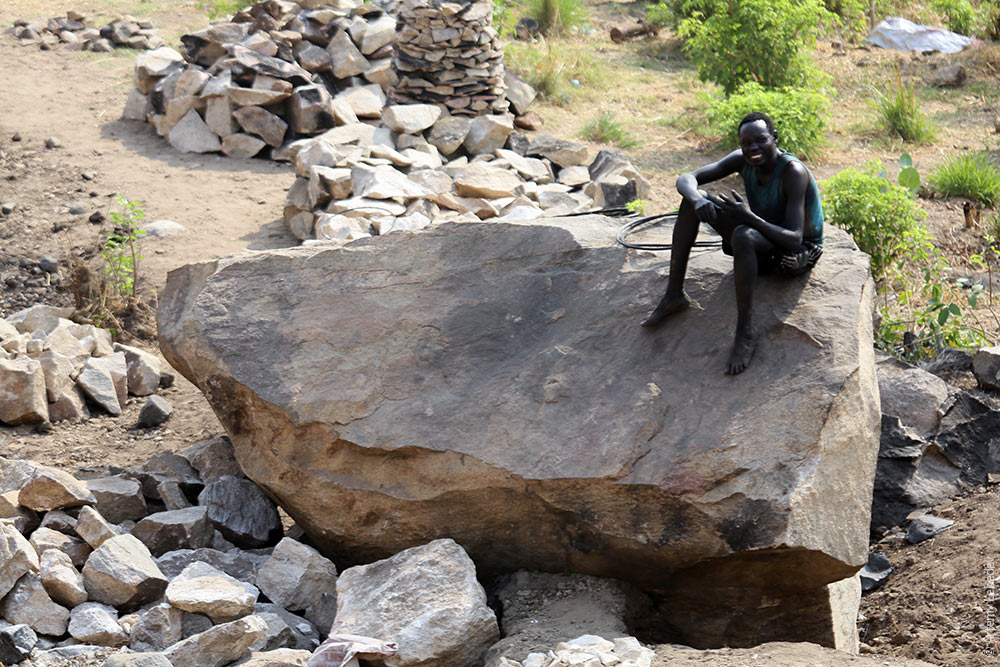 Для начала нужно под глыбой развести костер. Это сделает камень более хрупким. В качестве дров подойдут старые шины. First, a bonfire must be made under the boulder. This makes the rock more brittle. Old tires will do just fine as firewood. 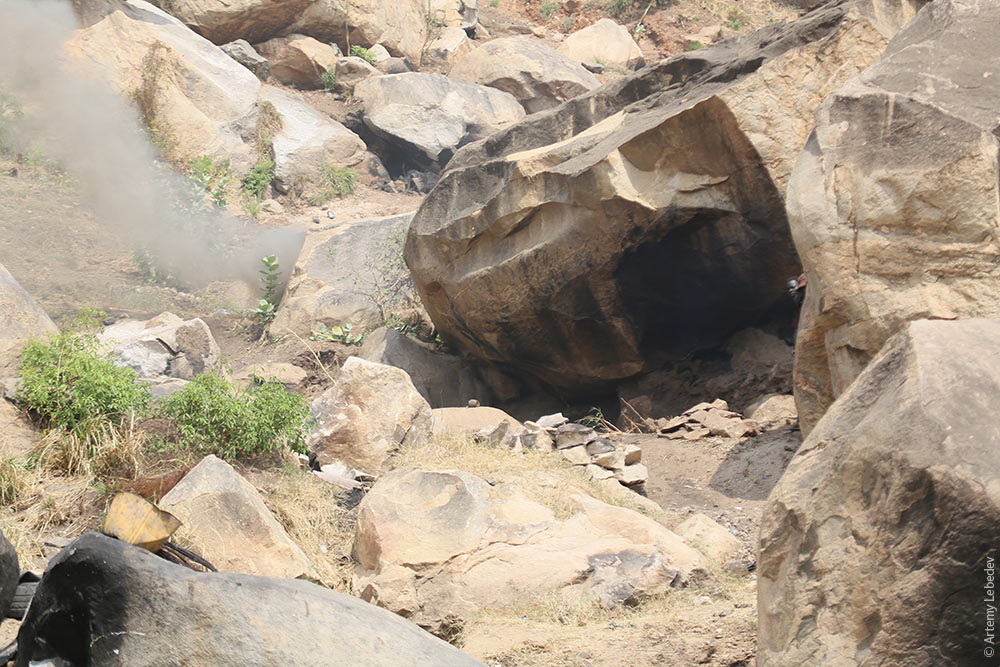 Затем в камень вставляется клин, по которому бьют кувалдой. Then a wedge is driven into the rock using a sledgehammer. 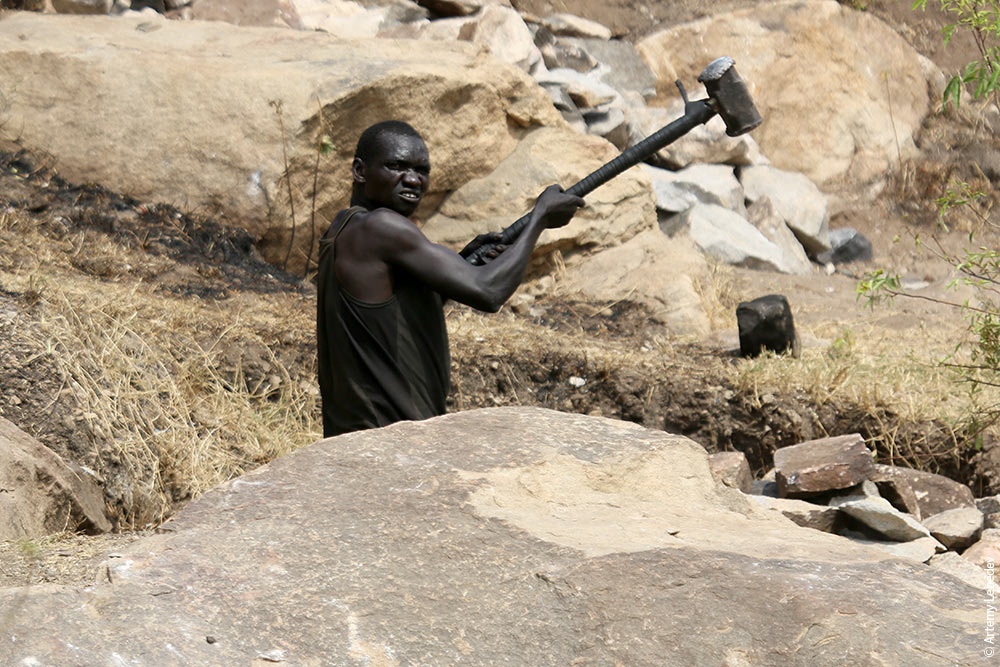 Отколовшиеся куски тащат вниз, к дороге. Вереница рабочих не прерывается. The chunks that break loose are carried down to the road by an uninterrupted chain of workers. 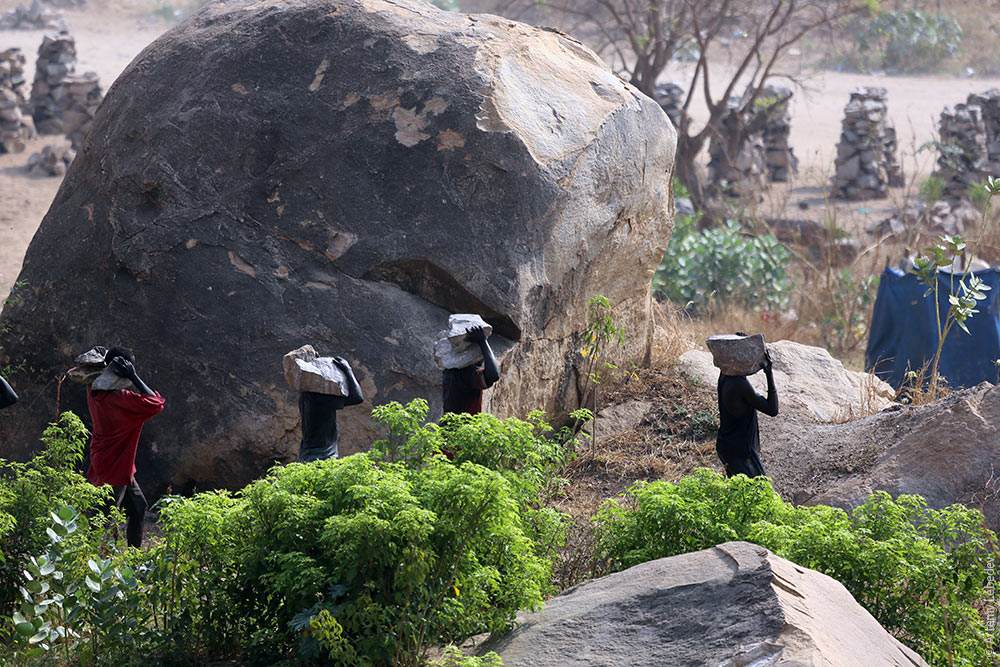 Притащили, свалили в кучу, пошли за новой порцией. They bring the rocks down, dump them in a heap, and head back for a new portion. 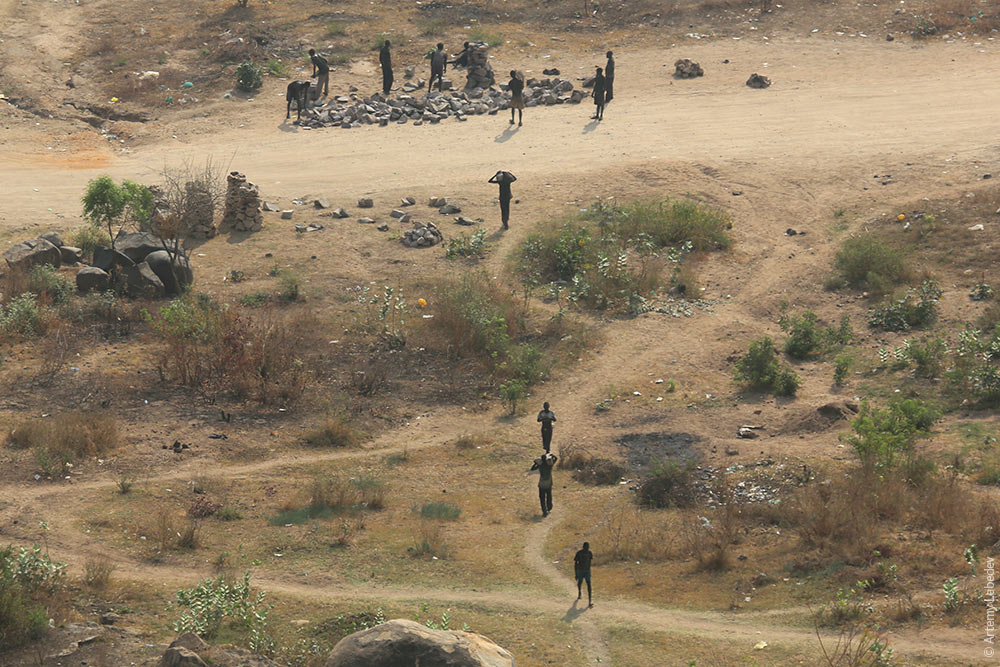 Камни разного калибра нужны для разных целей. Одни — для строительства заборов, другие — для домов, третьи — для дорог. Камни раскладываются по размерам. Different calibers of rock are utilized for different purposes. One for building fences, another for houses, a third for roads. The rocks are sorted according to size. 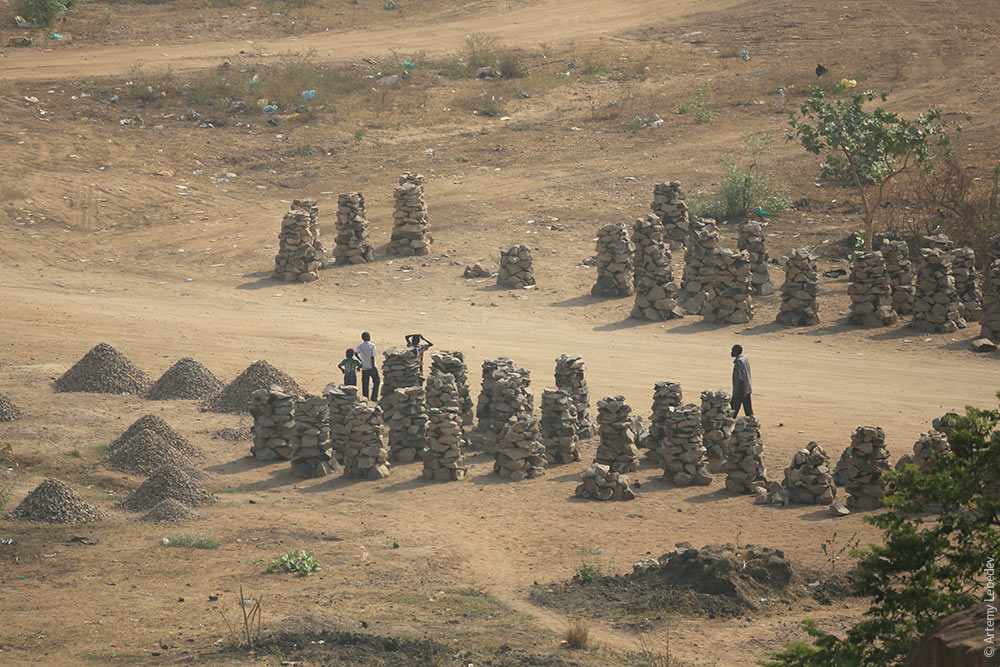 Крупные куски таскают мужчины. Men carry the larger chunks. 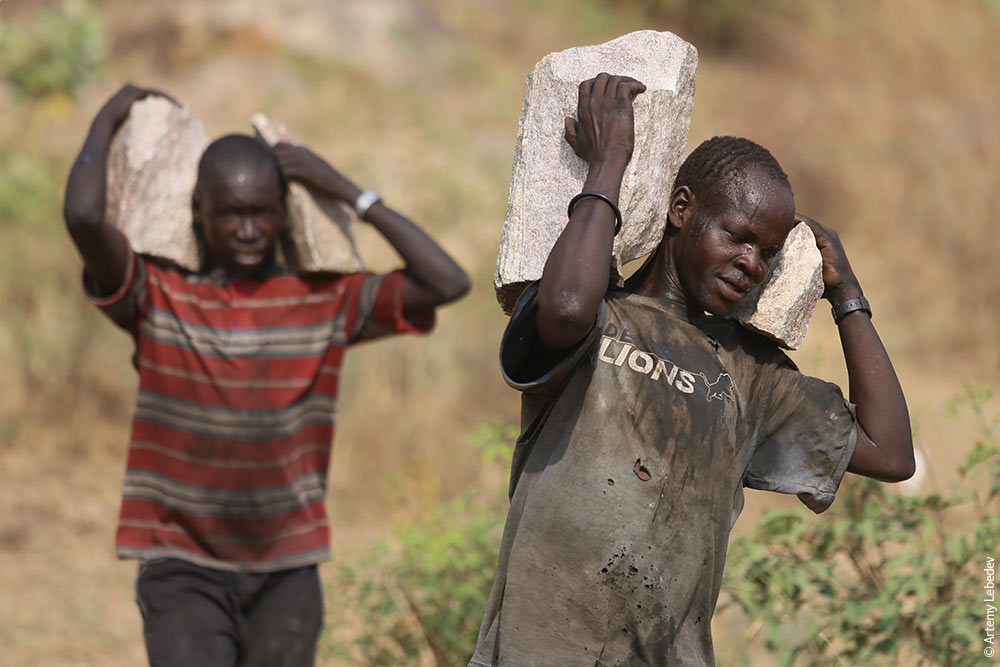 Камни среднего размера — женское дело. Medium-sized rocks are a woman’s job. 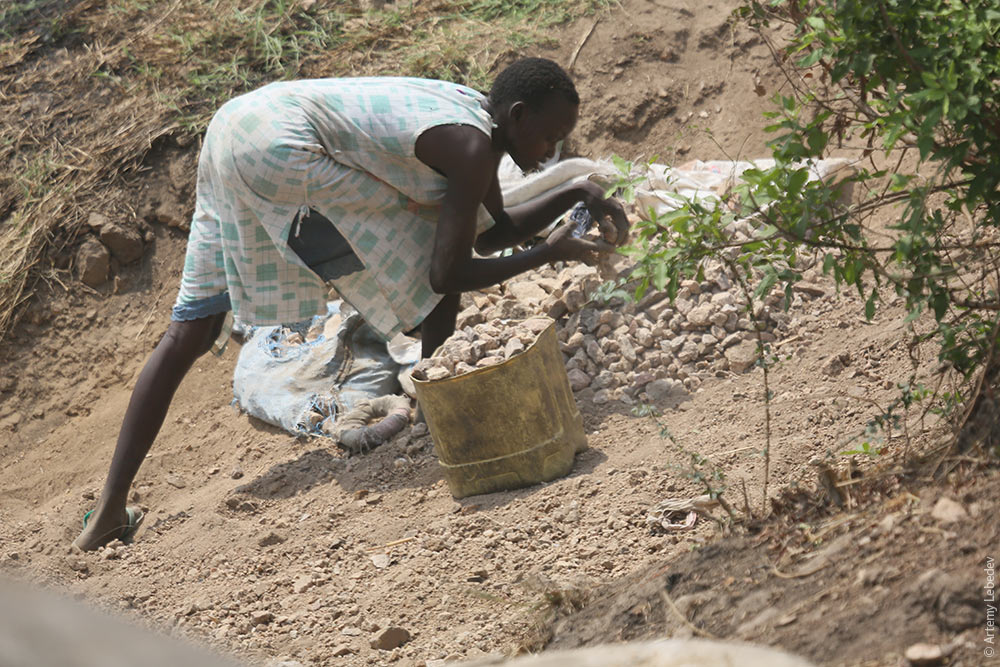 А детям самую простую работу дают — превращать мелкие камни в щебень. And children are given the easiest task—turning small stones into gravel. 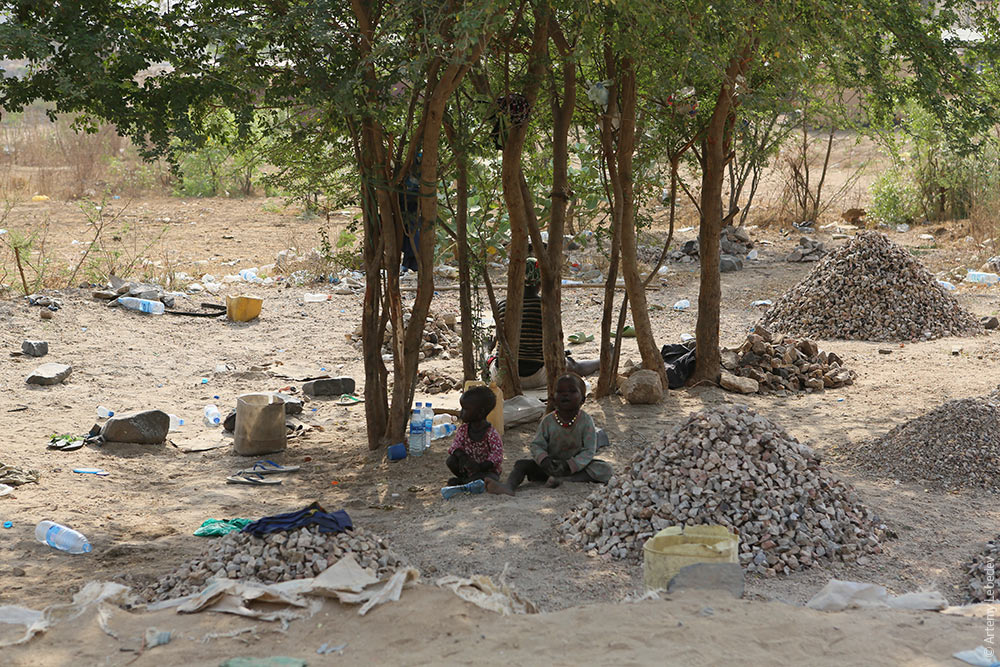 Приглашаем покупателей! Buyers welcome! 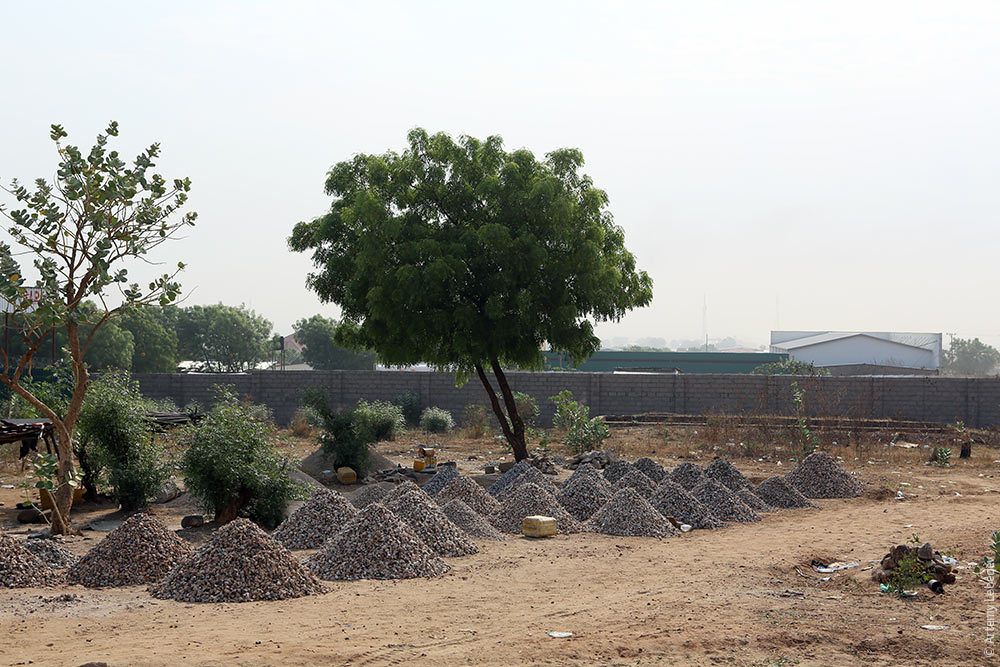 ДжубаJubaНа карте мира MapГосударство Южный Судан появилось на политической карте мира только в 2011 году. На главной площади столицы уже стоит монумент отцу-основателю с плеткой в руке. The state of South Sudan only appeared on the political map of the world in 2011. The capital’s main square already has a monument to the nation’s founding father, holding a whip in his hand. 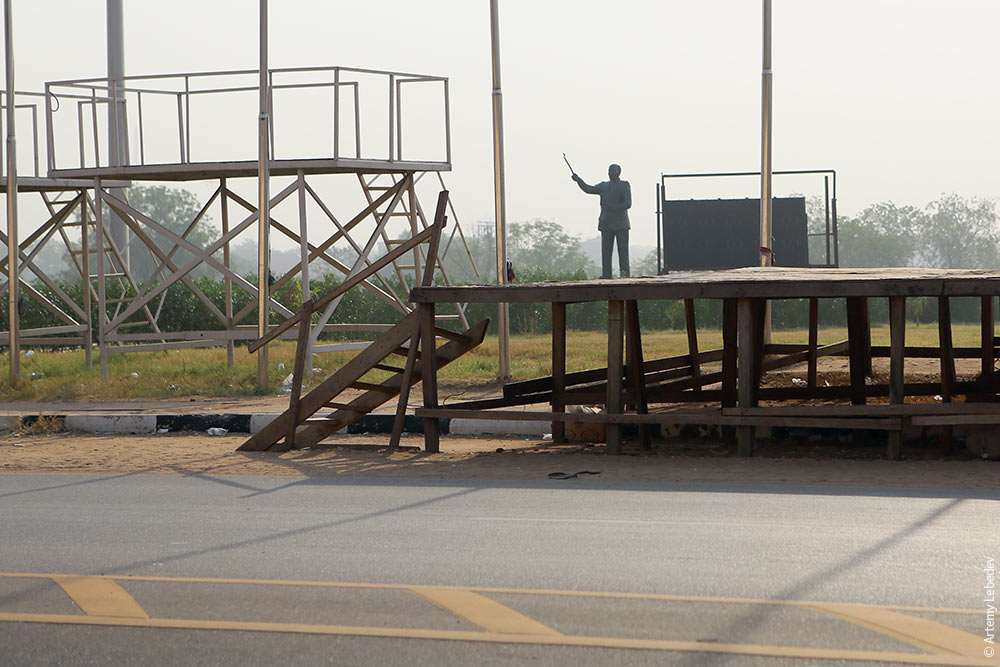 Цветущие сады и красивые здания пока что только нарисованы на рекламных плакатах. Blossoming gardens and beautiful buildings only exist on advertising posters thus far. 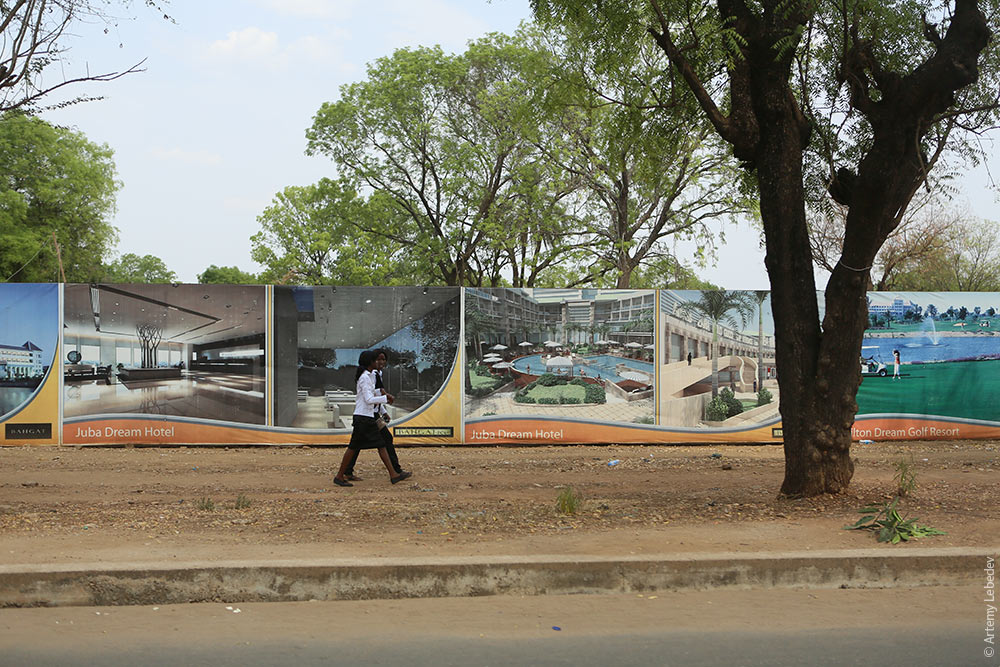 Во всей стране только 30 километров асфальтированных дорог. The entire country has only 30 kilometers of paved road. 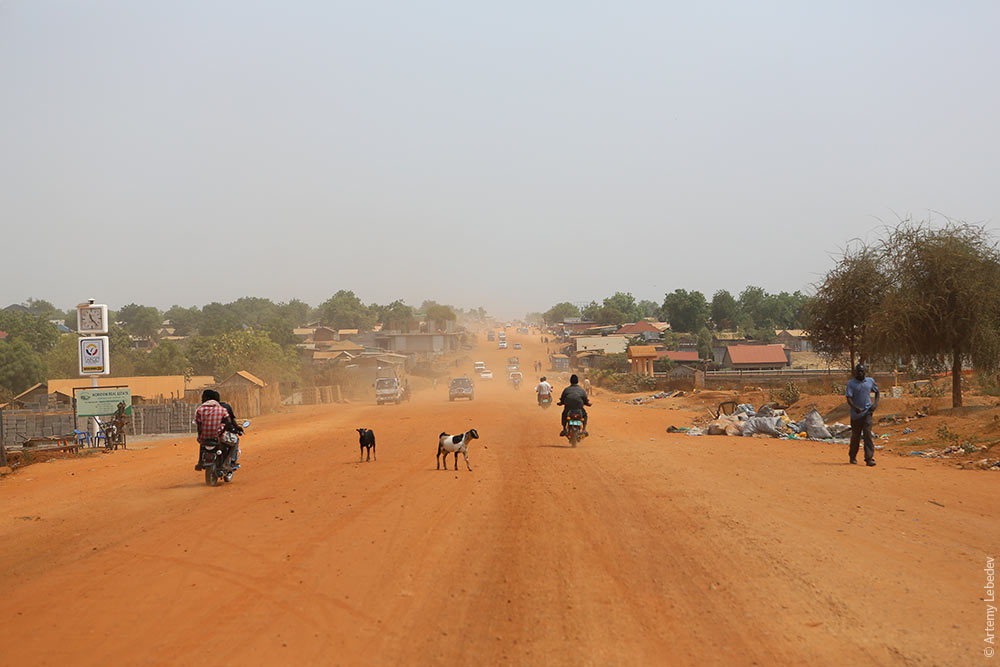 В стране нет помоек. Зачем нужны помойки, если мусор удобно ложится под ноги? There are no garbage dumps in the country. Who needs dumps when it’s so nice to feel garbage crunching underfoot? 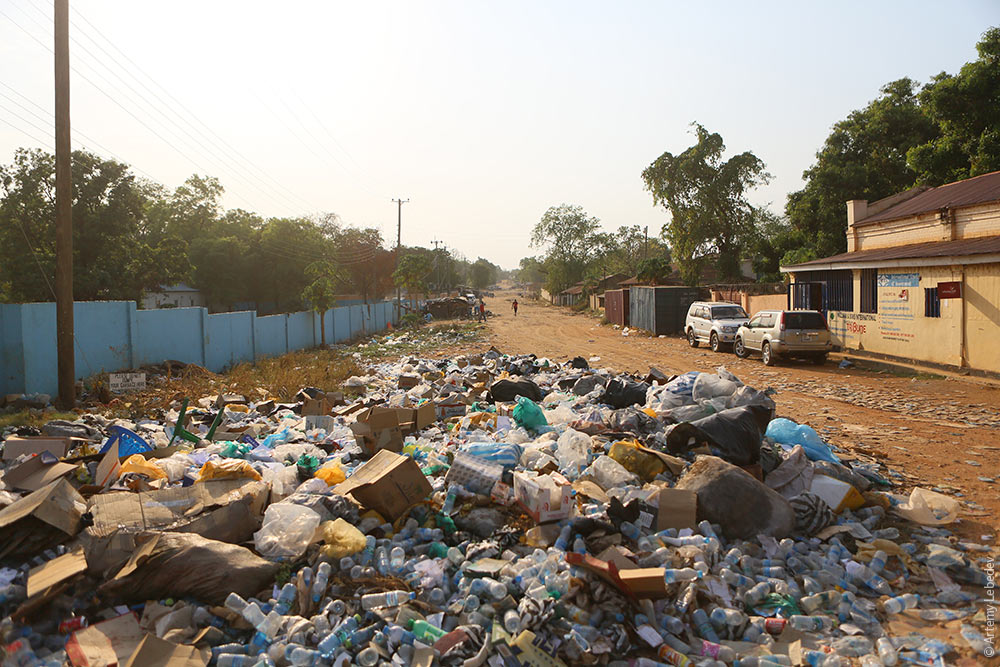 Отходы обладают удивительной способностью самоорганизовываться в кучки. Discarded waste exhibits a miraculous ability to organize itself into piles. 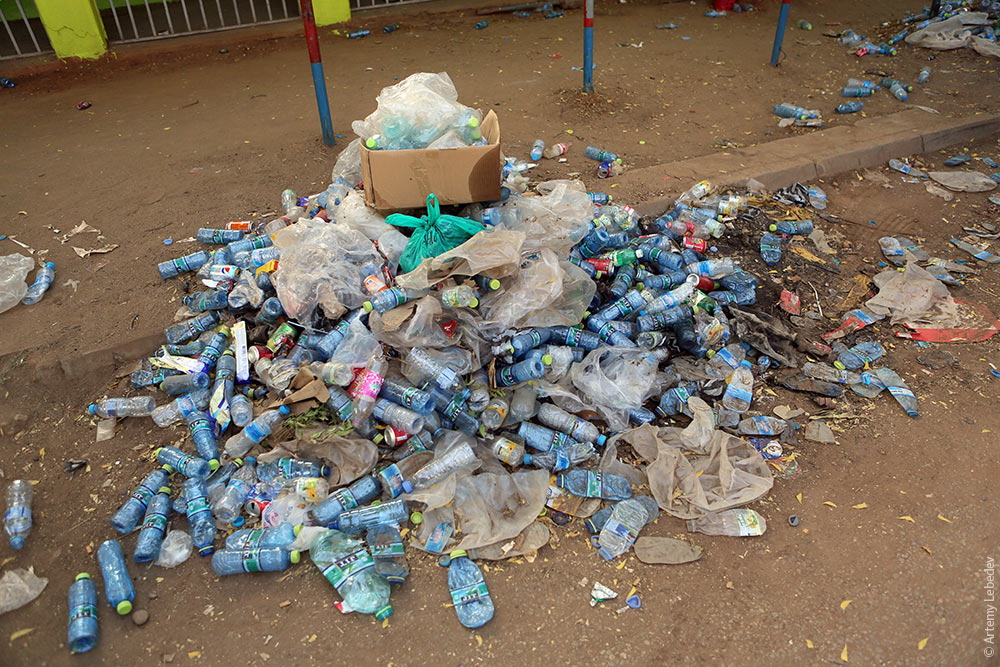 Редкие урны не пользуются популярностью. The few rare trash cans that exist don’t enjoy much popularity. 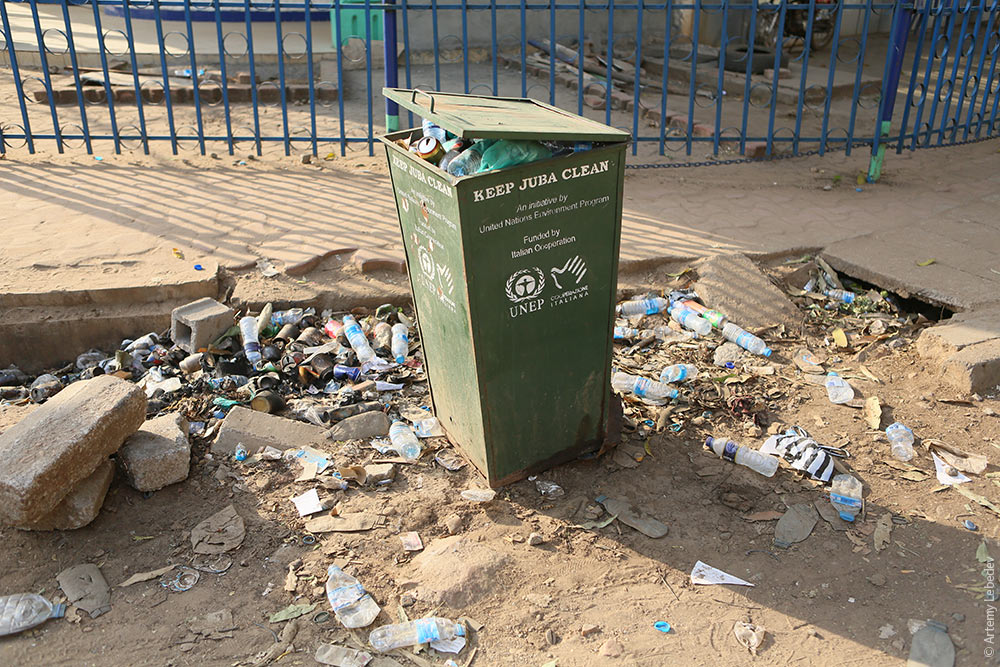 Так как воду здесь продают в бутылках (а не в полиэтиленовых пакетах), на улице валяются преимущественно бутылки. Автомобили идеально укатывают их до плоского состояния. Because water is sold in bottles here (and not in plastic bags), the streets are mainly littered with bottles. Passing cars reduce them to a perfectly flat state. 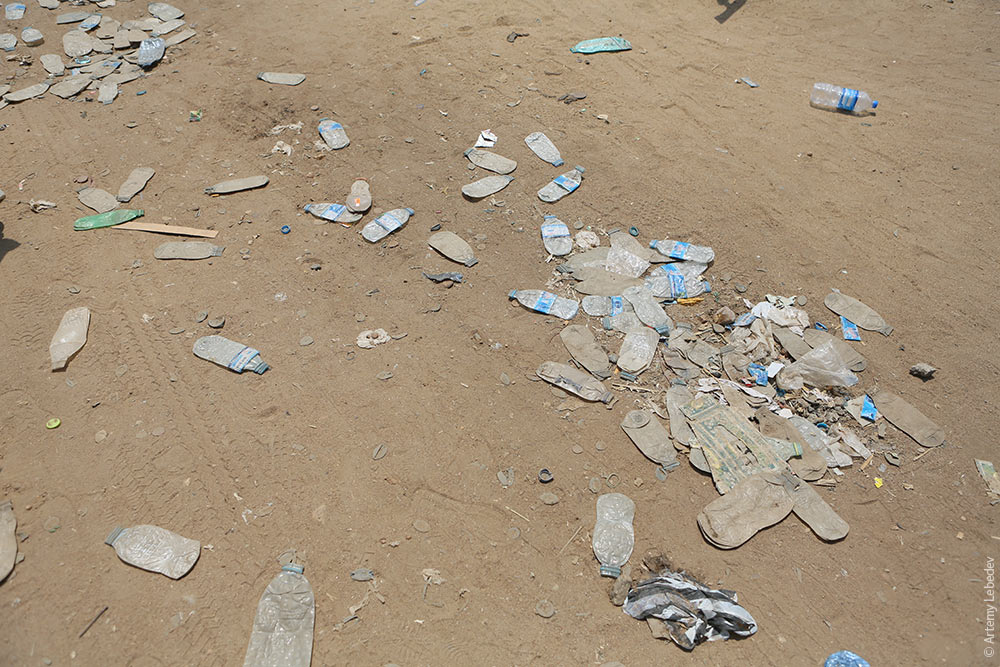 Напротив президентской резиденции. Across the street from the presidential residence. 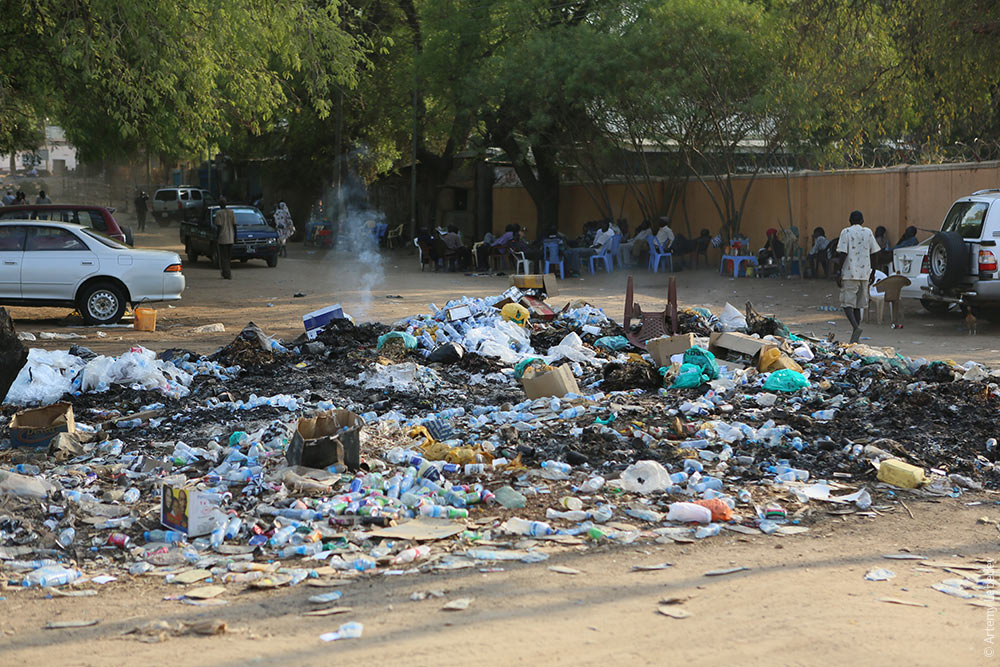 Упал электрический столб? Отлично! Будет на чем белье сушить. A fallen utility pole? Perfect! Now there’s something to hang laundry on. 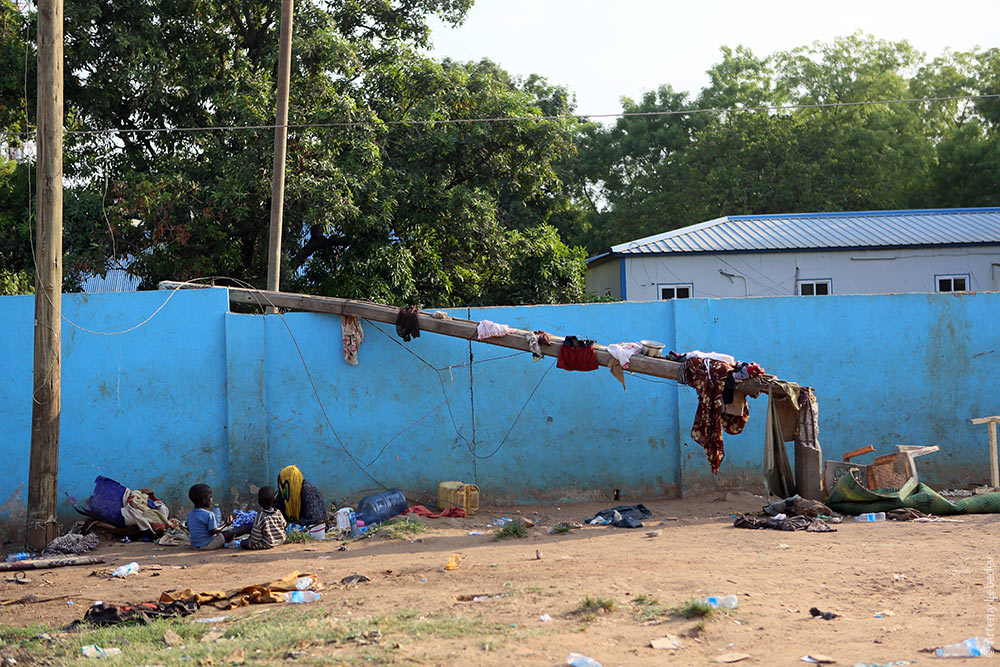 Улочка Джубы. Juba street. 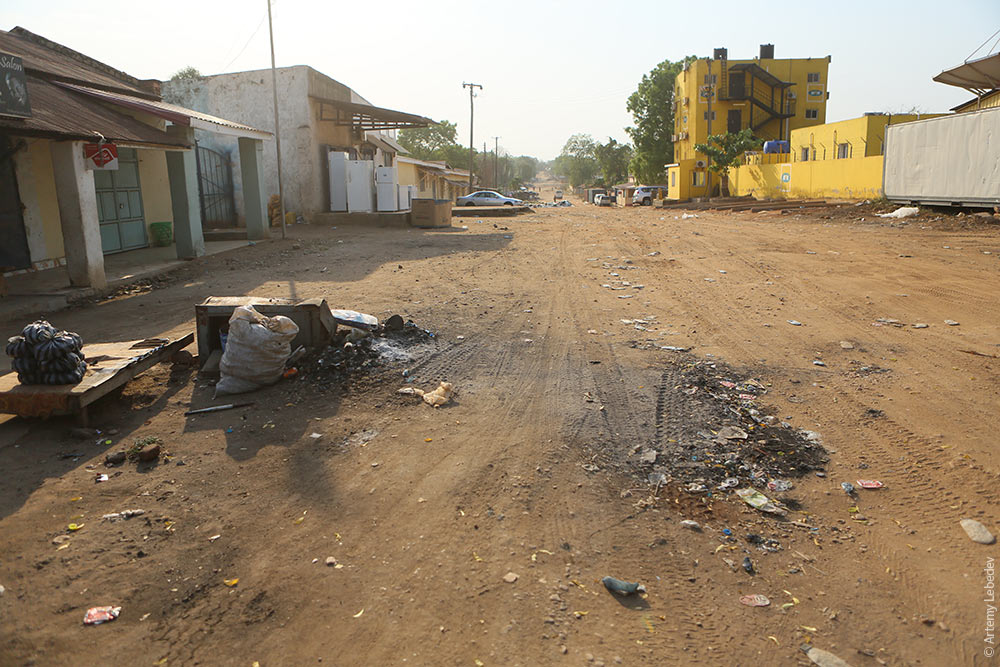 Автомобильный номер. A license plate. 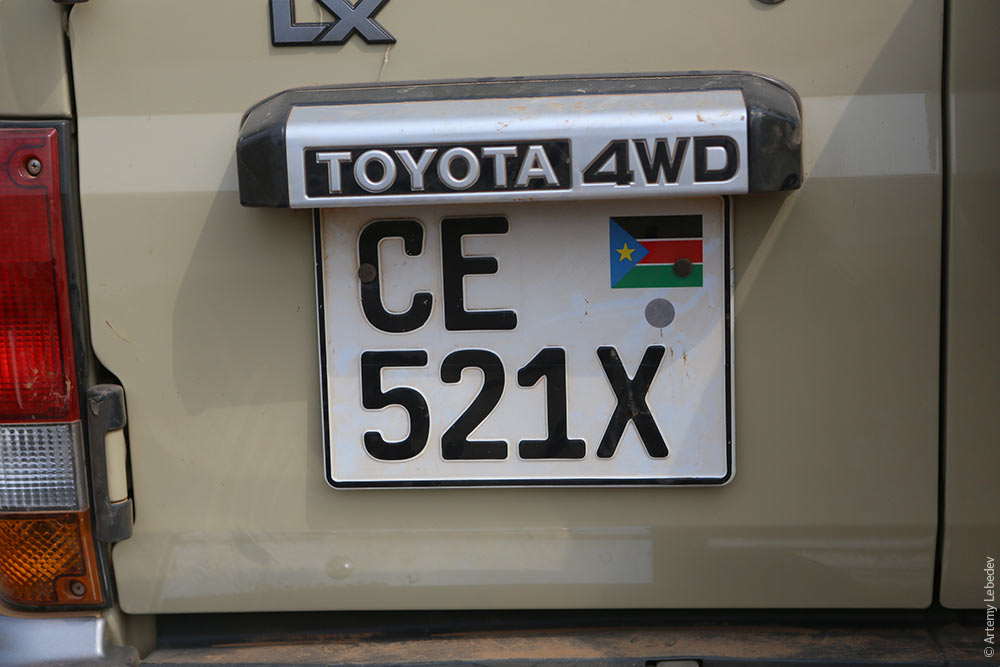 Впереди круговое движение. Roundabout ahead. 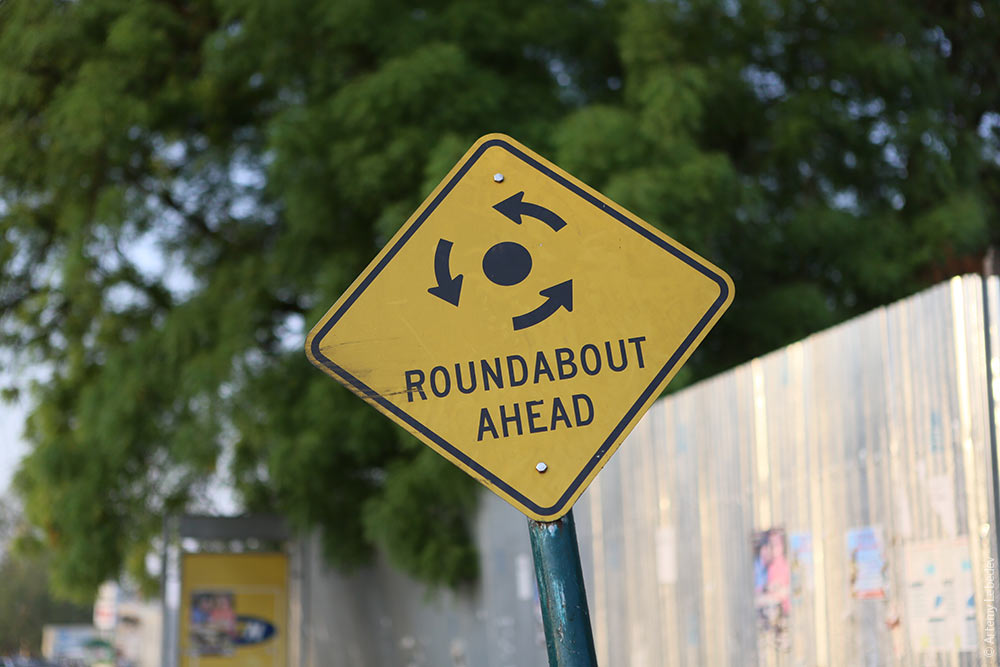 Грузовому транспорту проезд закрыт. No trucks allowed. 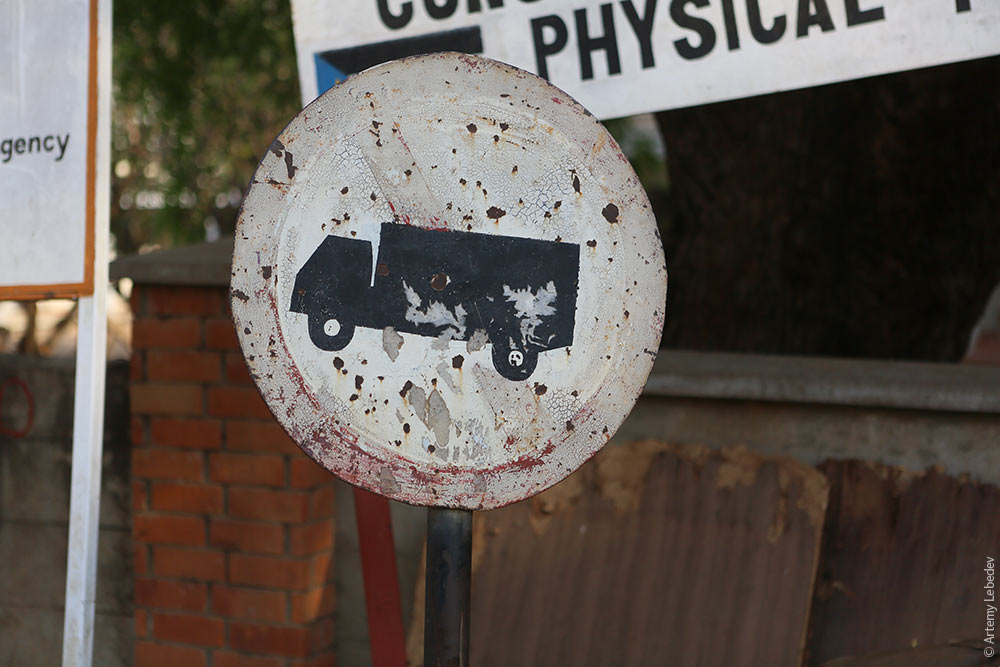 Школьники переходят дорогу. Student crossing. 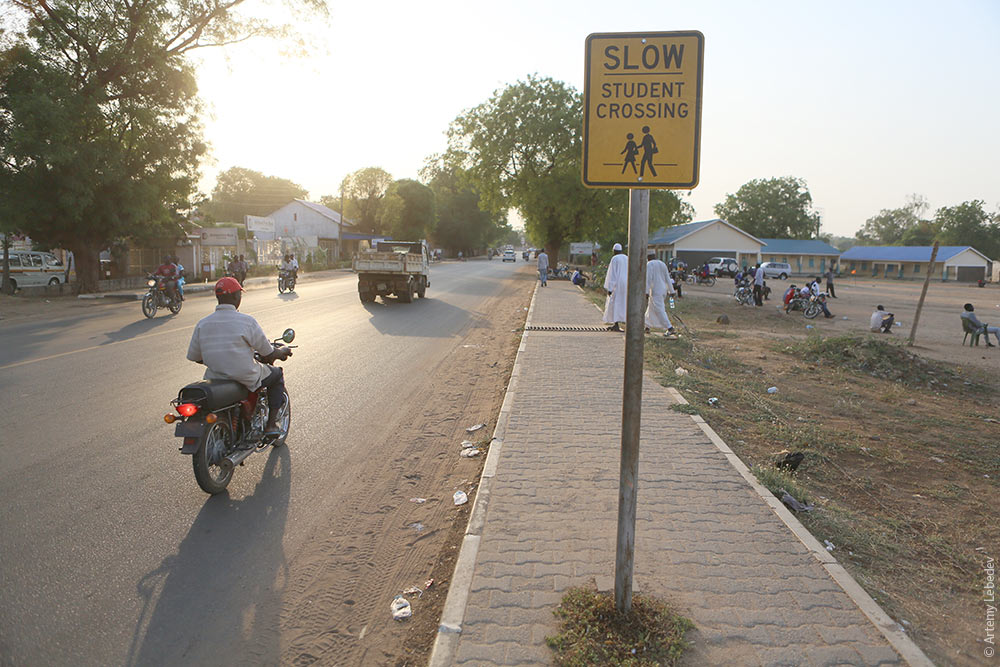 Мама с ребенком. A mother and child. 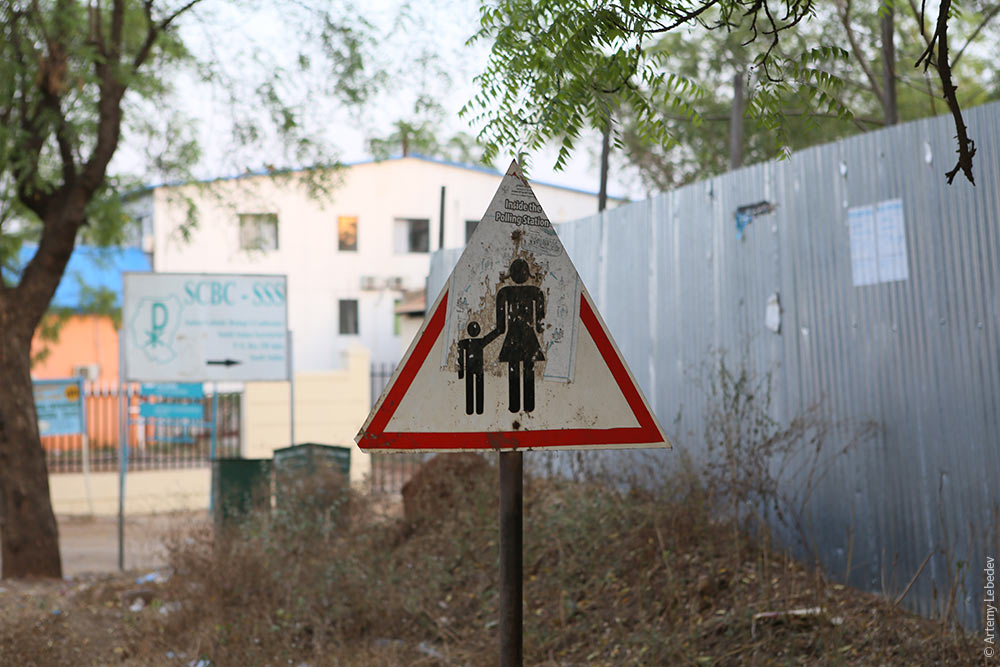 Таксисты на мотоциклах ждут клиентов на перекрестках. Никаких шлемов, разумеется, нет. Motorcycle taxis wait for customers on street corners. There are no helmets to speak of, naturally. 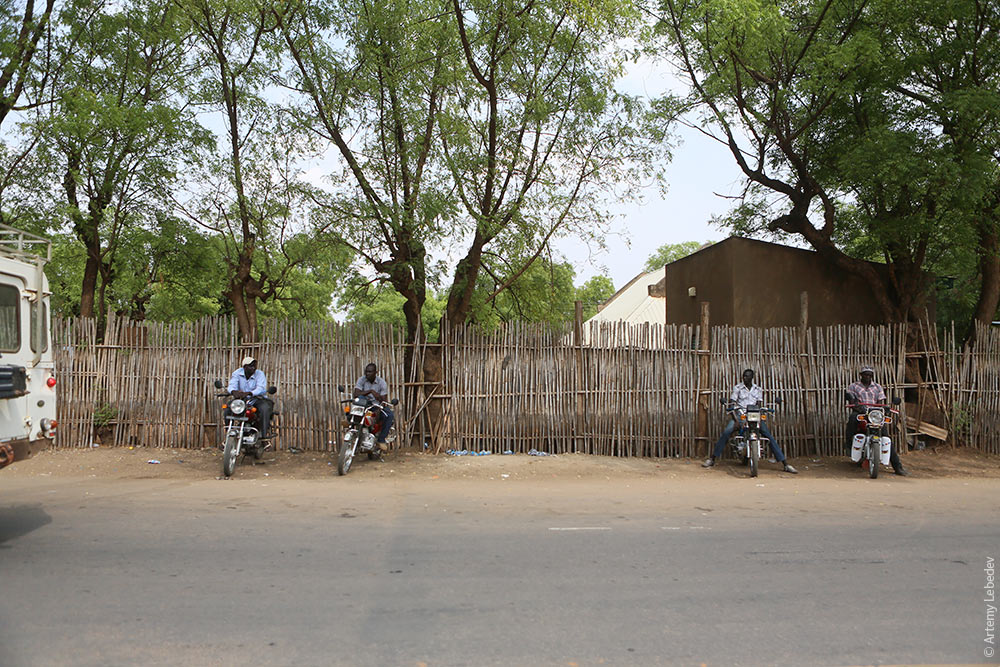 В стране полно других проблем, помимо избыточной заботы о безопасности. Перешагивать через метровый арык между автобусной остановкой и автобусом? Не развалитесь. The country has too many other problems to be overly concerned with safety. Stepping over a meter-wide irrigation ditch between the bus stop and the bus won’t kill you. 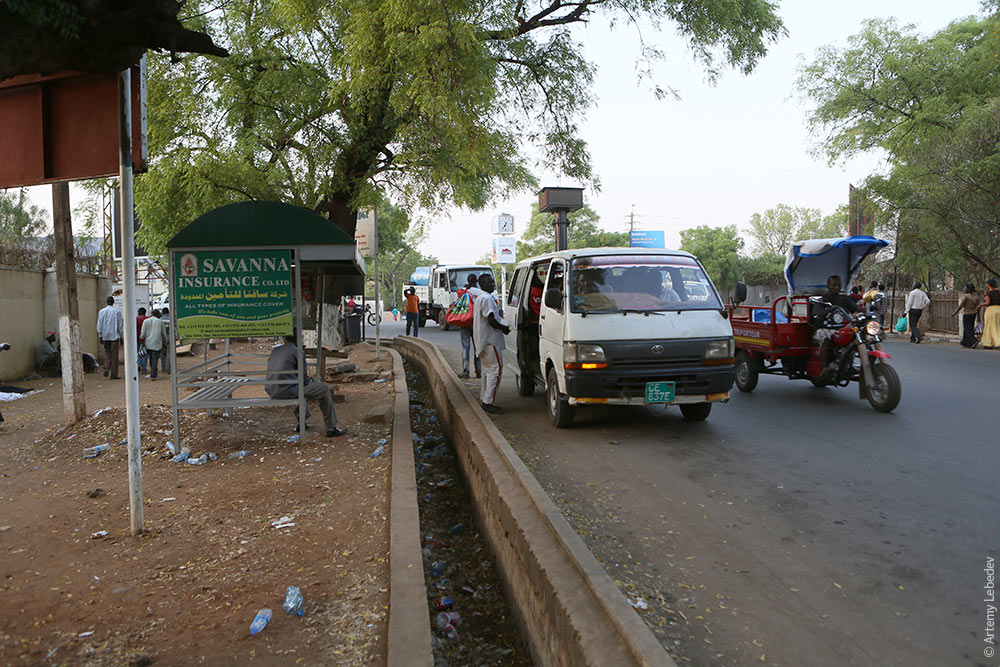 Водопровод отсутствует, поэтому воду развозят в цистернах по городу. There’s no water supply system, so tank trucks deliver water to various points around the city. 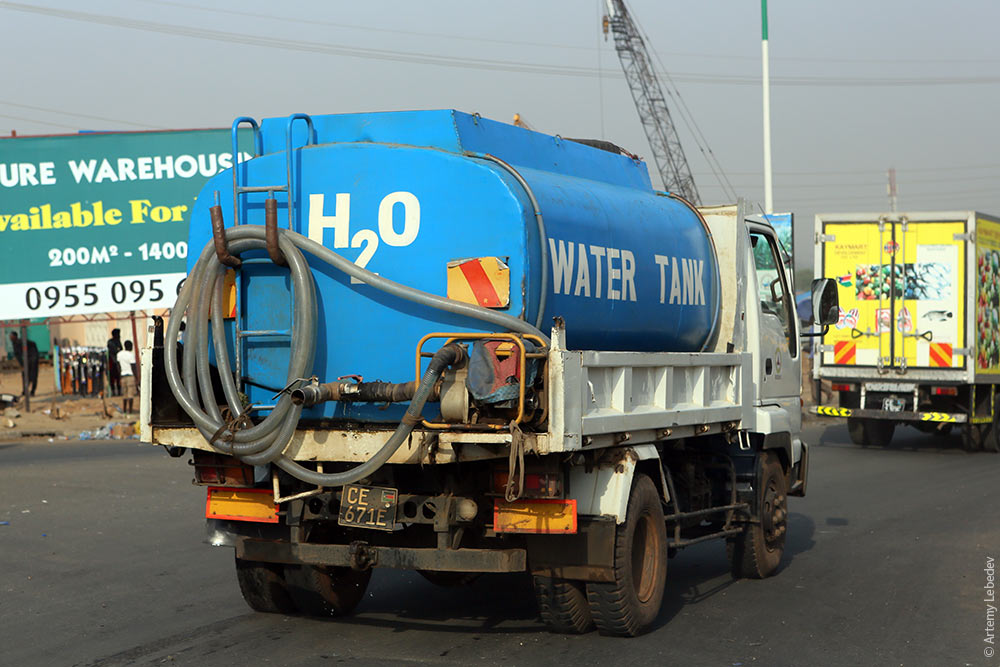 А дальше уже все таскают до дома традиционные африканские желтые канистры на голове или в тачке. And from there, everyone carries their water home in the traditional African yellow canisters, either on their heads or on wheelbarrows. 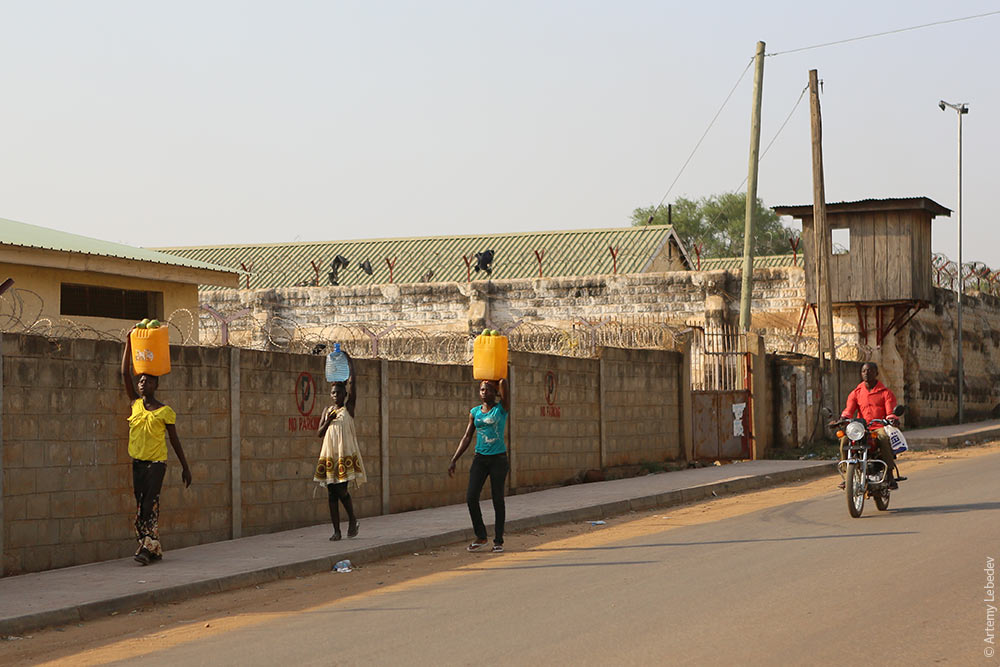 Уличные указатели. Street signs. 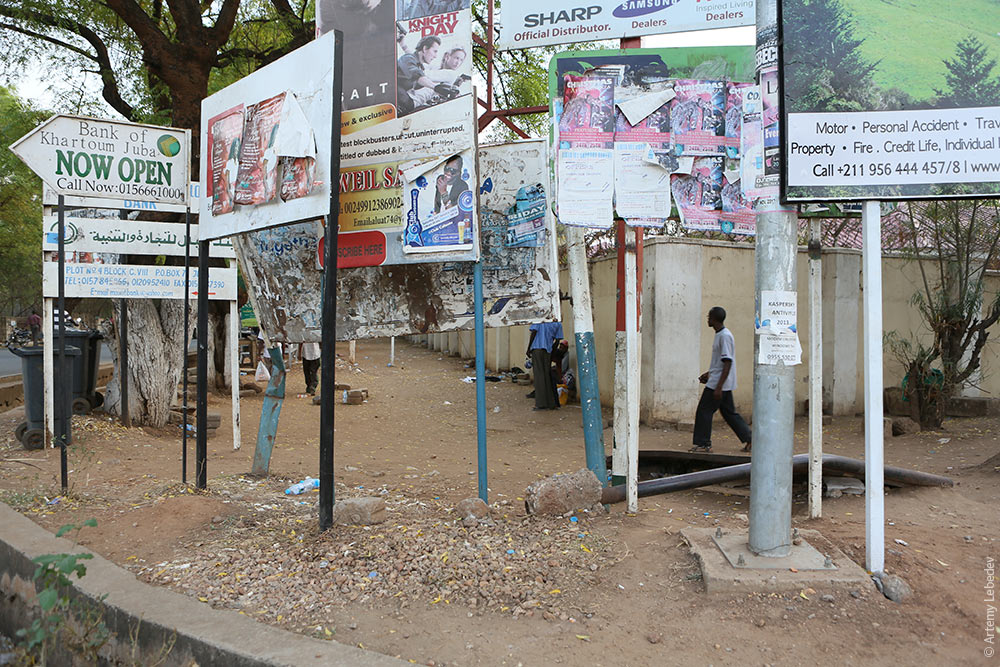 Южносуданцам не чуждо изящество. The South Sudanese are no strangers to niceties. 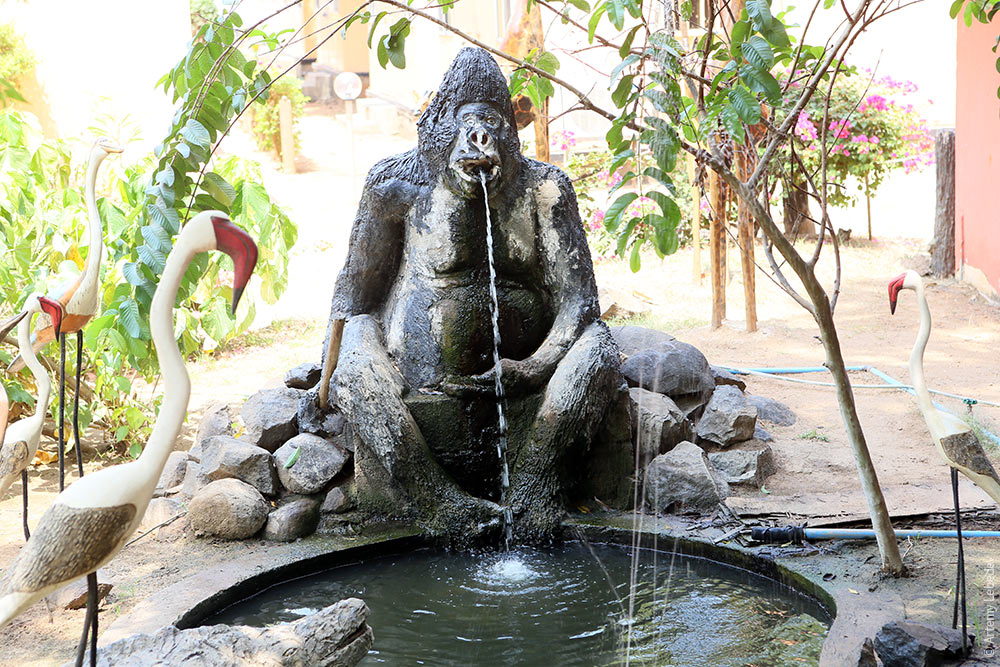 На рынке продаются специальные подставки для углей, на которых все готовят еду. Special stands for hot coals, on which everyone cooks their food, are sold at the market. 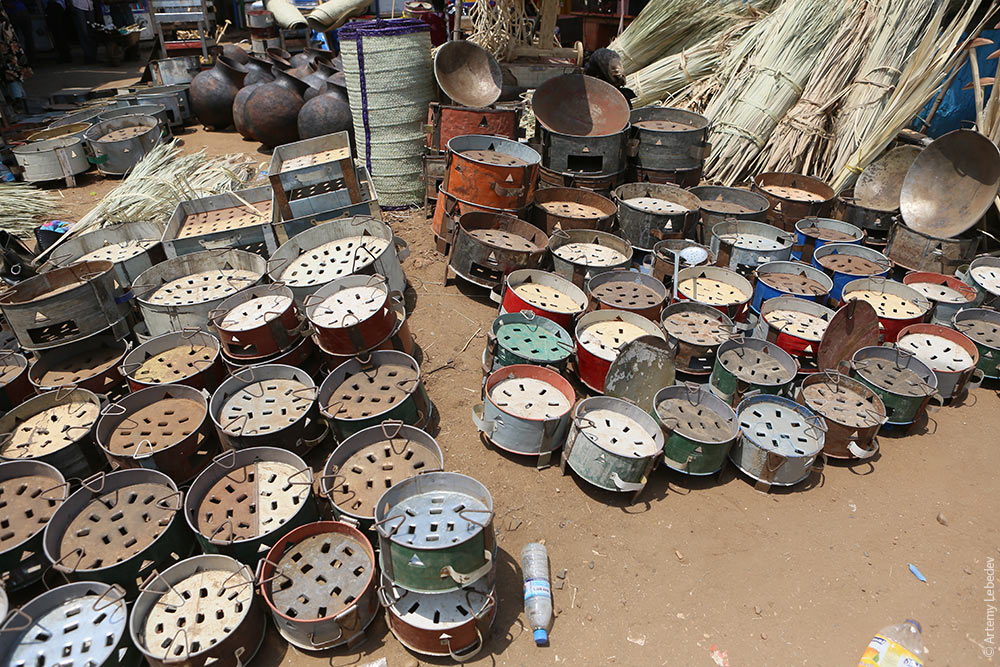 Продажа дерева для заборов. Wood for fences for sale. 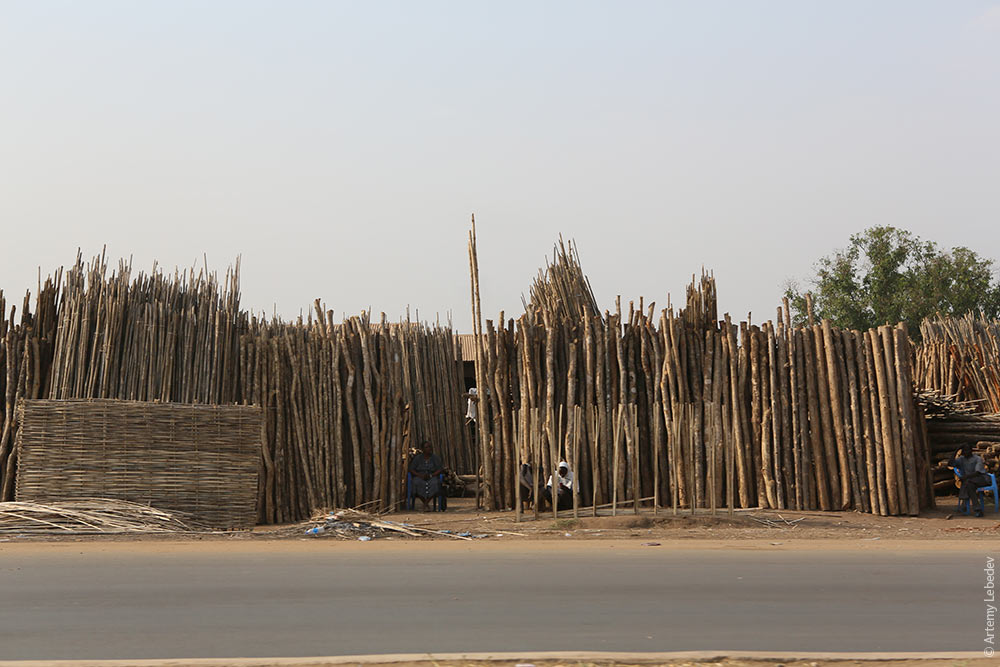 Лежащая на тротуаре неподъемная дверь от сейфа символизирует наличие рядом меняльных контор. Когда-то тут находился банк. An unliftable safe door on the sidewalk signifies the presence of currency exchanges nearby. There was a bank here once. 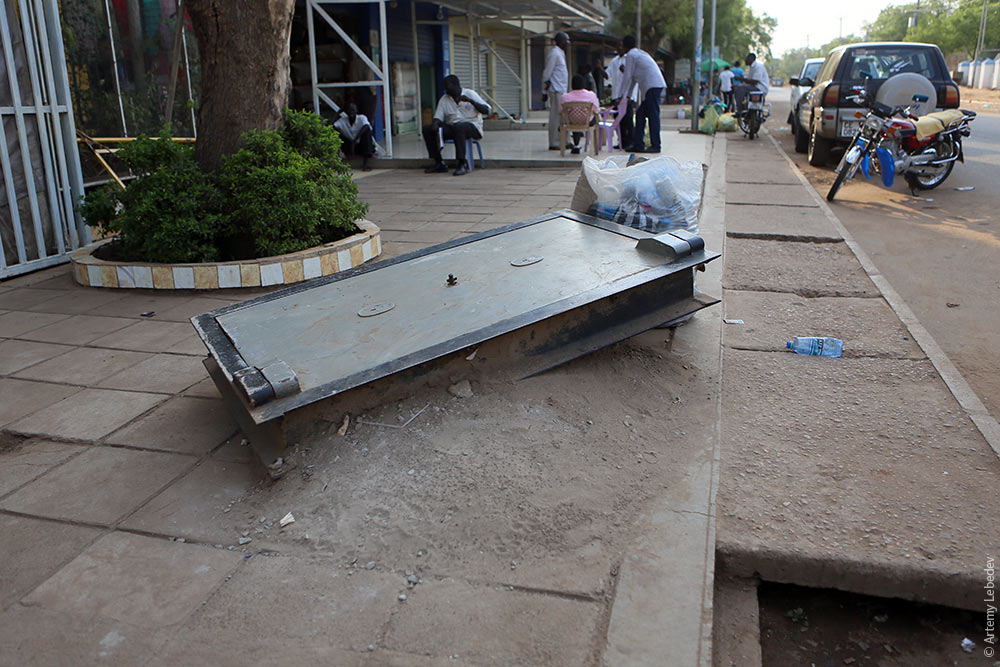 Новые здания строят из металлических балок, как в Иране. New buildings are constructed out of steel beams, like in Iran. 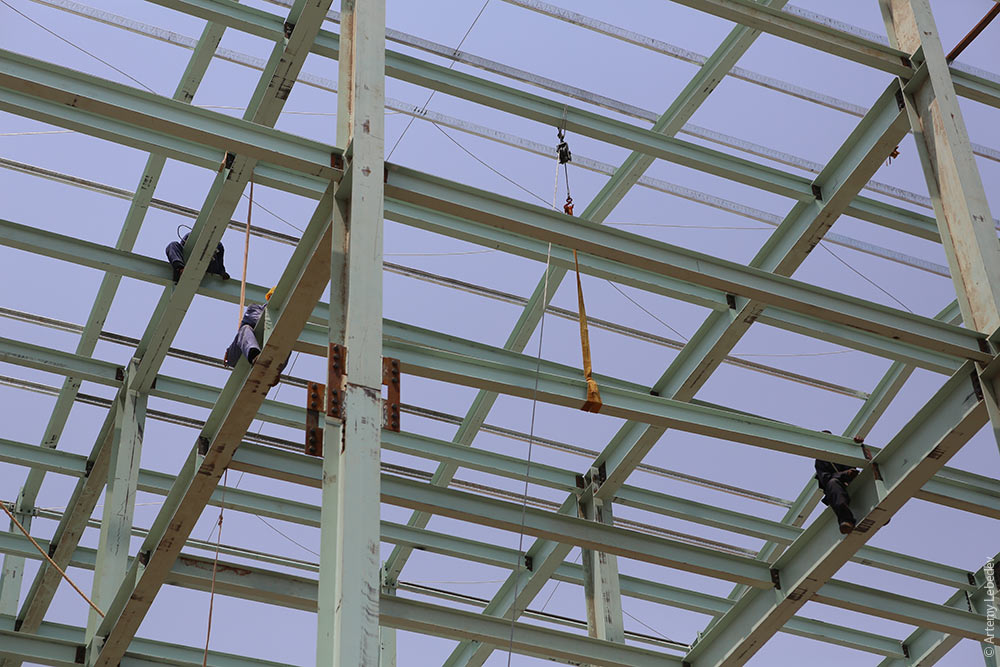 Когда-то президент Джордж Буш мл. подарил президенту Сальве Кииру ковбойскую шляпу. С тех пор Киир всегда выглядит как на приеме в Техасе. President George W. Bush once presented president Salva Kiir with a cowboy hat. Ever since then, Kiir always looks like he’s attending a reception in Texas. 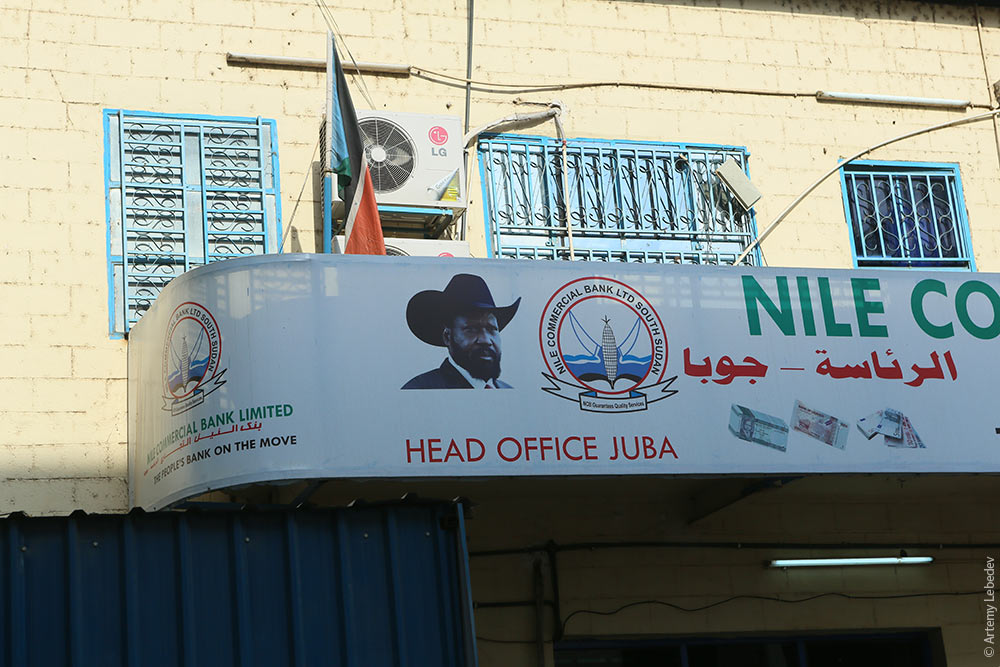 Школьницы. Schoolgirls. 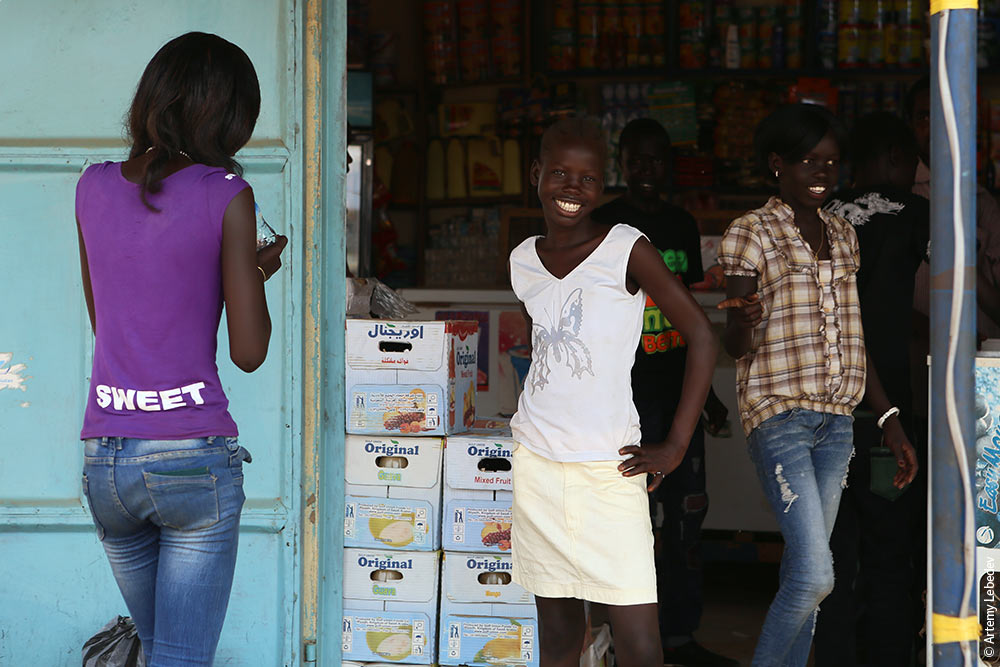 Городская сумасшедшая. A local crazy woman. 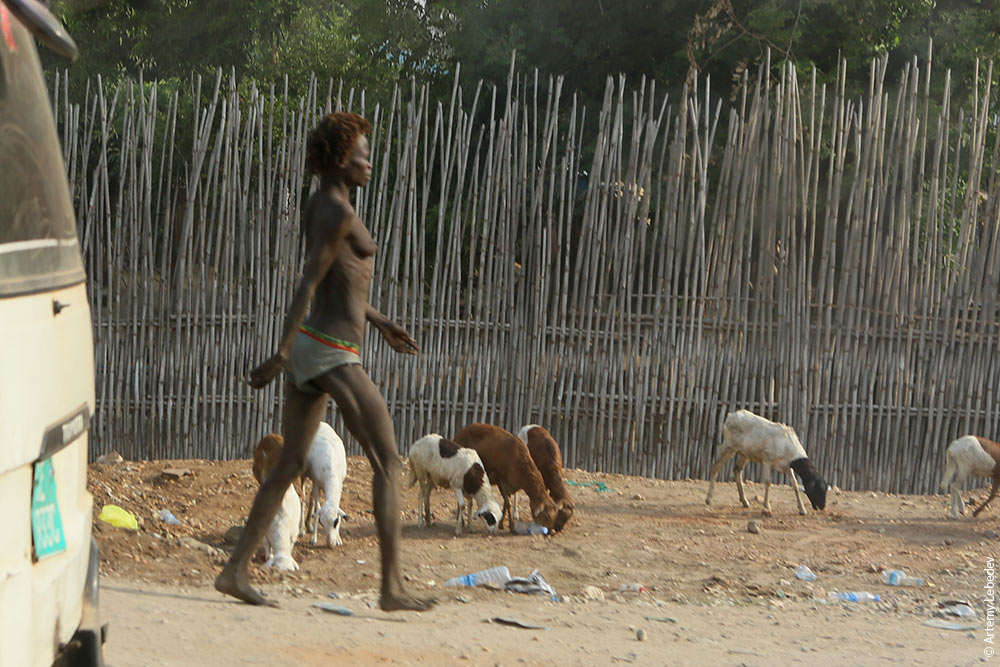 Полное дерево марабу. A tree full of marabous. 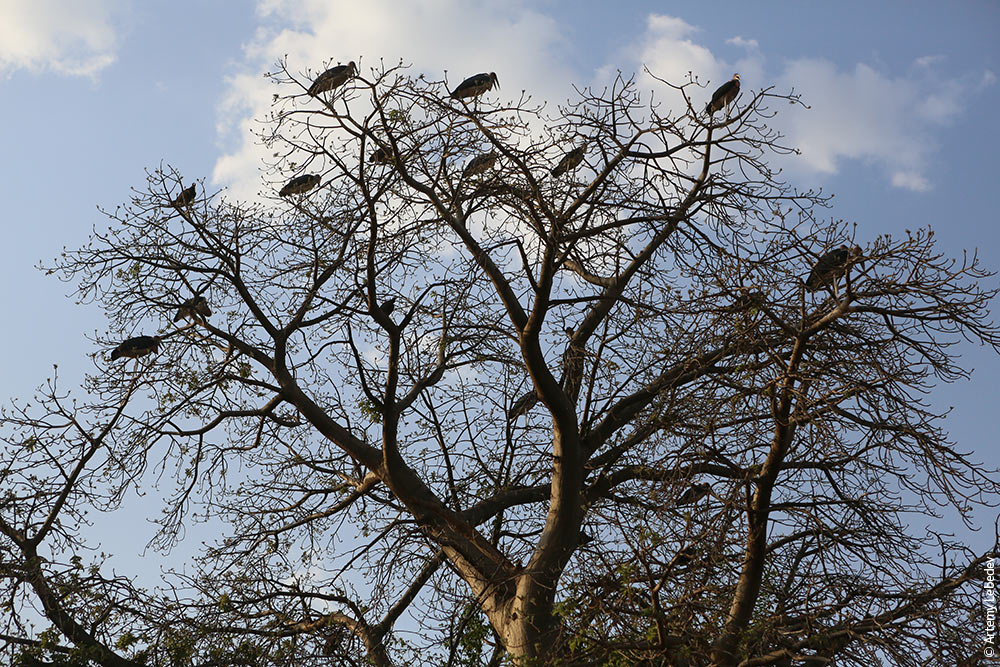 Солдат дрессирует обезьяну. A soldier training a monkey. 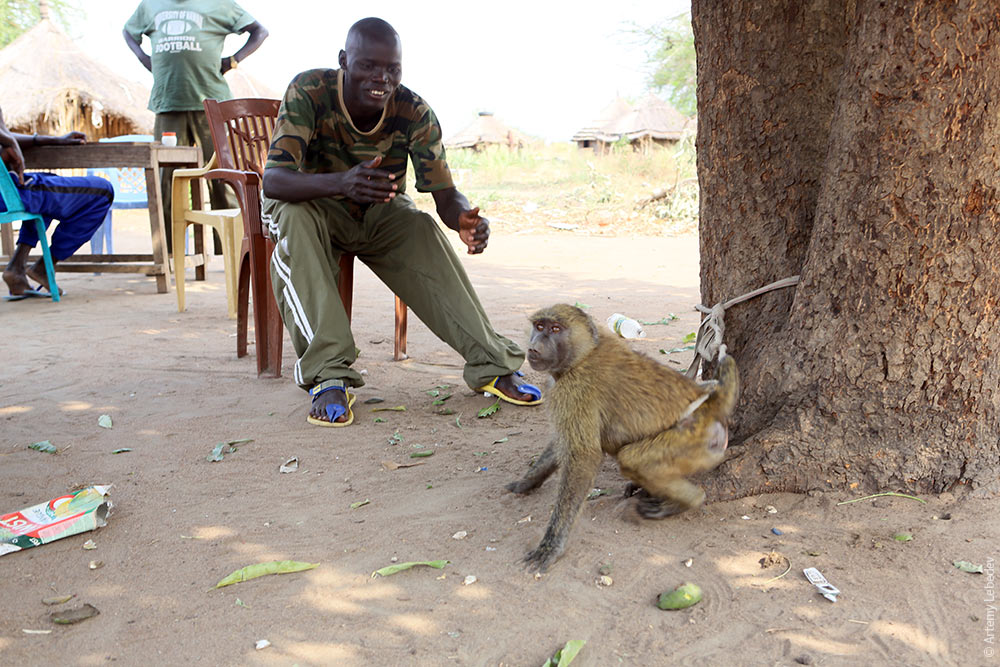 Летим дальше. We fly onward. 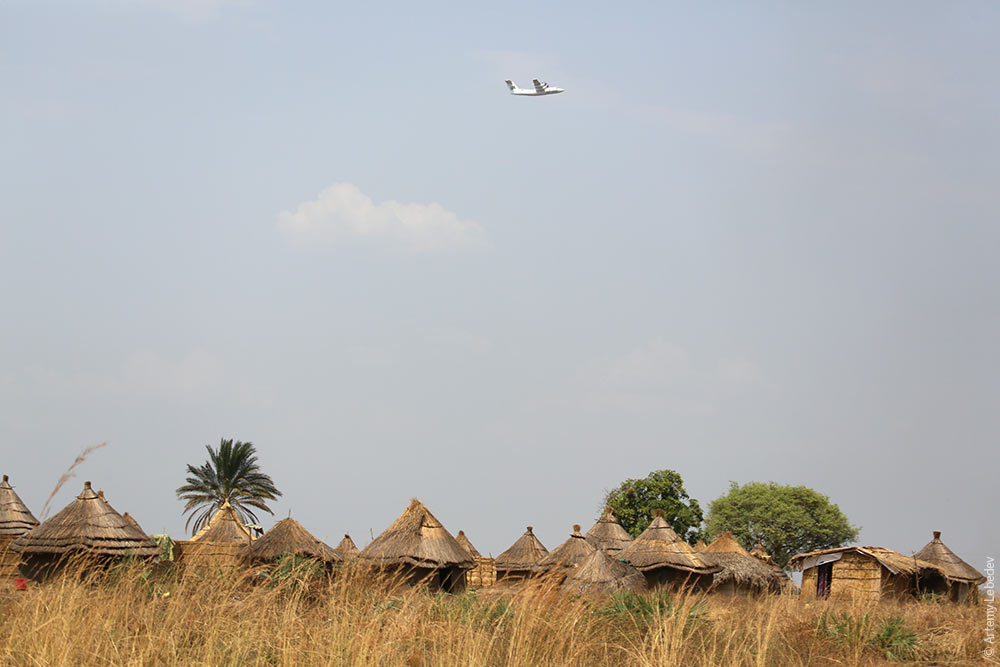 * * *
В какой-то книжной лавке чудом нашлись открытки. Пошел на почту за марками, хотя все местные убеждали, что почты не существует или что она не работает. Существует и работает. Долго объяснял, какие открытки и куда хочу послать, долго обсуждал стоимость пересылки. Наконец, продали набор марок. Я радостно наклеил их на открытки, подписал и протягиваю клерку.
By sheer miracle, I was able to find some postcards at a bookshop. I then went to the post office for stamps, despite the locals’ unanimous assurances that there was no post office or that it was closed. There is one and it was open. I spent a long time explaining what postcards I wanted to mail and where, followed by a lengthy discussion about the postage price. At last, I was sold a set of stamps. Jubilant, I stuck them onto my postcards, filled in the text, and handed the postcards to the clerk. |